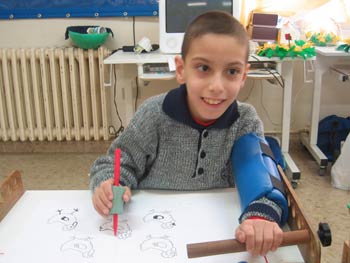

News
Victory in Court for Special Needs Family
Attorney Leone, representing a family in Nashoba Regional School District, won the case. [September 2020] Representing Children with DisabilitiesSchool Districts have a duty to provide a free, appropriate public education ("FAPE") to children with disabilities. The components of this education should be incorporated into an Individualized Education Plan ("IEP"). The United States Supreme Court has defined an appropriate education as one that is "reasonably calculated to confer meaningful educational benefit(s)". However, Congress may have raised the standard for FAPE by language contained within No Child Left Behind and IDEA 2004. The IEP must contain objective data, if available, which shows the child's current level of performance, and it must include goals which are both meaningful and measurable. While goals need to be realistic, Congress has stated that the team must set high expectations for children with disabilities to make progress in the general curriculum (defined in Massachusetts by the Curriculum Frameworks). Once an IEP is written, School Districts are required to implement the plan and provide proof of effective progress to Parents.
However, Congress may have raised the standard for FAPE by language contained within No Child Left Behind and IDEA 2004. The IEP must contain objective data, if available, which shows the child's current level of performance, and it must include goals which are both meaningful and measurable. While goals need to be realistic, Congress has stated that the team must set high expectations for children with disabilities to make progress in the general curriculum (defined in Massachusetts by the Curriculum Frameworks). Once an IEP is written, School Districts are required to implement the plan and provide proof of effective progress to Parents.
Unfortunately, the process can break down at numerous points, and Parents often need to proceed to Due Process Hearing in order to enforce their child's rights under state and federal laws, which provide for both substantive and procedural rights. For instance, Parents are an important member of the team which drafts the child's IEP. The law directs School Districts to highly respect parental input and provides specific procedural protections to Parents. If Parental input is not given adequate consideration, and/or procedural protections are not complied with by the School District, the BSEA may find the School District in violation of the law. (Some examples of procedural violations are: failure to have classroom teacher present during Team Meetings; failure to give notice of Parents' rights; failure to give adequate notice of planned meetings; failure to give written notice of school district refusal to make changes to IEP requested by Parents; and failure to conduct evaluations within the timelines.) Web ResourcesIndividuals with Disabilities Education Act - IDEA is a law ensuring services to children with disabilities throughout the nation. IDEA governs how states and public agencies provide early intervention, special education and related services to more than 6.5 million eligible infants, toddlers, children and youth with disabilities.Council of Parents, Advocates and Attorneys - COPAA's mission is to be a national voice for special education rights and to promote excellence in advocacy. Our primary goal is to secure high quality educational services for children with disabilities. WrightsLaw - Parents, educators, advocates, and attorneys can find on WrightsLaw accurate, reliable information about special education law, education law, and advocacy for children with disabilities. Attorney Pete Wright has assembled thousands of articles, cases, and resources about dozens of topics. National Research Center on Learning Disabilities - NRCLD's goal is to help educators, policymakers, and parents understand the complexity and importance of making sound decisions regarding whether a child has a specific learning disability. Our research in this area - including studies of the role of and best practices associated with responsiveness to intervention - is the foundation underlying all of the materials available on this site. Autism Speaks - our goal is to change the future for all who struggle with autism spectrum disorders. We are dedicated to funding global biomedical research into the causes, prevention, treatments, and cure for autism; to raise public awareness about autism and its effects on individuals, families, and society; and to bring hope to all who deal with the hardships of this disorder. We are committed to raising the funds necessary to support these goals. Asperger/Autism Network - our mission is to foster awareness, respect, acceptance, and support for individuals with AS and related conditions and their families. Special Needs Advocacy Network - for over 25 years, SPAN has provided continuing professional development and support for advocates and other professionals in the field of Special Education across Massachusetts. Collaborate with other professionals as well as with parents of children with disabilities. Bureau of Special Education Appeals for the Commonwealth of Massachusetts - The Bureau of Special Education Appeals ("BSEA") conducts mediations, advisory opinions and hearings to resolve disputes among parents, school districts, private schools and state agencies concerning eligibility, evaluation, placement, individualized education programs (IEPs), special education services and procedural protections for students with disabilities. Massachussets Law for Children with Special Needs - This is the existing law as enacted by the Massachussets Legislature - General Law, Chapter 71B. Yellow Pages for Kids - Find educational consultants psychologists, diagnosticians, health care specialists, academic tutors, speech language therapists, advocates, and attorneys. You will also find government programs, grassroots organizations, special education schools, and parent support groups. Special Education Dept. at Massachusetts DESE - Provides technical assistance and guidance on the special education process, including governing law, forms, and complaint procedures. |

Carla C. Leone, Esq. |
 |